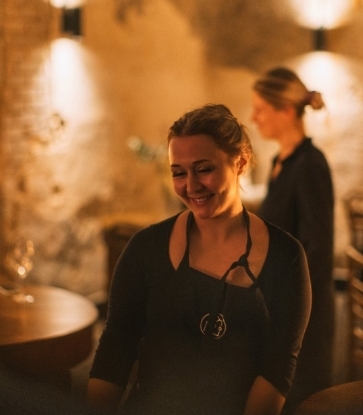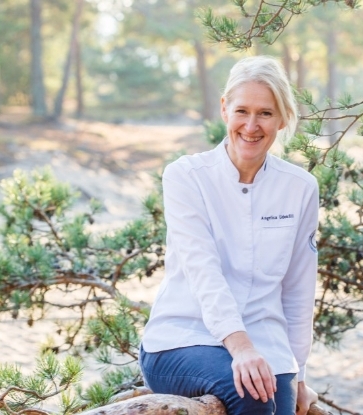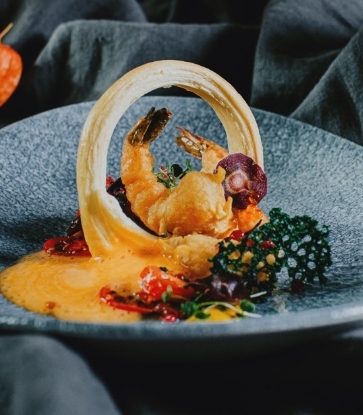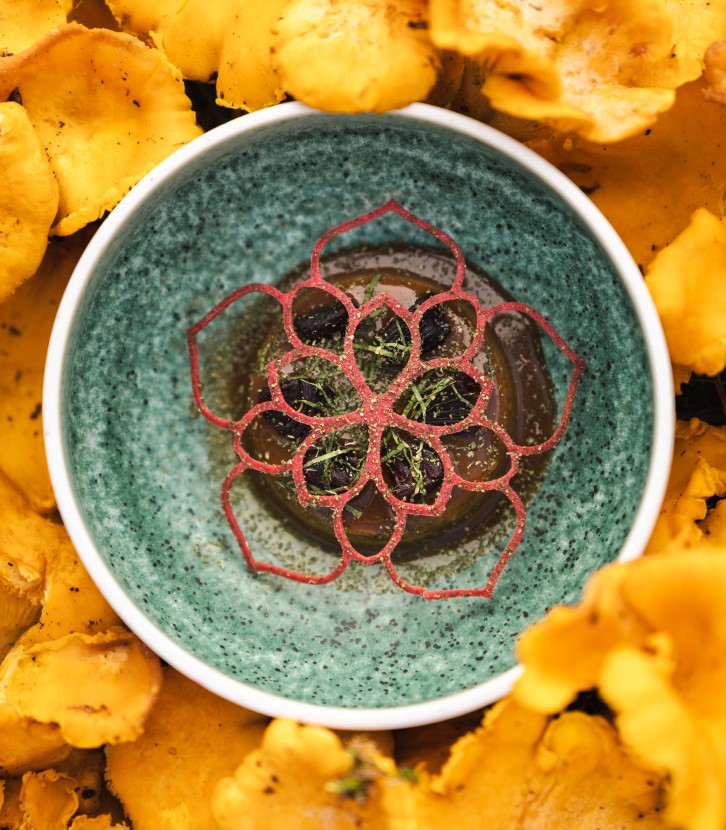Lithuania’s first MICHELIN Guide selection saw a host of restaurants recognised with distinctions, with four of Vilnius’ restaurants (Demo, Džiaugsmas, Nineteen18 and Pas mus) awarded a Michelin Star for their outstanding cuisine and three more (14Horses, Gaspar's and Le Travi) honoured with a Michelin Bib Gourmand for their great quality, great value cooking. From rustic to luxurious surroundings, places for a light lunch to those perfect for a celebratory meal, these restaurants – as well as the 19 others recommended in the main selection – are a reflection of how the capital offers something for everyone when it comes to dining out.
The overriding theme in the city’s culinary scene is one of modernity, with the majority of restaurants – including all four Starred establishments – offering contemporary, innovative cuisine. Here, we take a closer look at One-Michelin-Starred Pas mus, led by a trailblazing former architect with a love for history, nature and the arts.
The second MICHELIN Guide selection to Lithuania will be unveiled at the end of May 2025. Watch this space to discover the latest restaurants to be awarded MICHELIN Guide distinctions, as well as those who have retained their awards this year.
Bookmark this page and check back to be among the first to explore the new selection.
A Home From Home
At first glance, Pas mus represents a pronounced departure from the grand, pastel-hued buildings of Vilnius’ surrounding Old Town. Behind the restaurant’s simple glass frontage you’re met with chic, minimalist interiors: white walls, black curtains, large mirrors and simple glassware. A handful of dark wooden tables are simply laid with vintage cutlery and white cotton napkins, while a wall of dripping candles adds a dramatic flair. But sit down for the tasting menu at this small restaurant and its Lithuanian DNA soon shines through.Vita Bartininkaite, the founder, owner and chef of Pas mus Restoranas, explains the intimate design. “I want the guests to feel like they’re my friends who just came round to my place, and we all relax, lose track of time and just have a great dinner together. From the very beginning, I imagined an informal, cosy and elegant place.” After all, ‘pas mus’ loosely translates to visiting someone at home.

From Architect to Restaurateur
It’s not a well-trodden career path, but while working as an architect, Vita made the decision to “do a 180” and enter into the world of gastronomy. In 2018, with just “some experience in pastry” on her CV, she managed to land a position in the kitchen at Nineteen18 – “one of the best restaurants in Lithuania” (then located at the Hotel Pacai in Vilnius). One promotion quickly followed another, with Vita progressing to Sous Chef and then Assistant Head Chef.In 2019, Vita took on a month-long internship at Geranium in Copenhagen – a luxury restaurant with a meat-free tasting menu and Three Michelin Stars. This game-changing career opportunity galvanised Vita’s gastronomic ambitions. “I came back with the understanding that I wanted to pull Lithuanian gastronomy upwards, that perhaps I could also achieve great things as I felt I was moving in the right direction,” she explains.
Opening Pas Mus in 2022 was a spur-of-the-moment decision, born of Vita’s desire to experiment more in the kitchen. “I came to understand that I wasn’t able to conduct all of the meticulous, long-term processes that I desired in a large, crowded and fast-paced kitchen, so I had two options: go abroad, where everyone was pushing me to go, or open a small, personal place,” Vita says.
The chef shared her idea with a colleague and, within just a few weeks, the pair were making it happen. They took on the job of renovating the space themselves and made “everything literally from scratch”. Vita’s former partner crafted the furniture, while her mother collected vintage plates and cutlery.
Asked about the continued underrepresentation of female chefs in kitchens – if being a woman makes it harder to launch and operate a restaurant – Vita notes that “running a restaurant is hard for anyone, regardless of gender,” citing the long hours and personal sacrifices. “However, women tend to be less likely to dive head-first into such areas,” she says.
“Honestly, I came into this world not really knowing what’s waiting for me. If I did, maybe things would be different now, maybe they wouldn’t, it’s hard to say. I just try to enjoy this interesting journey and see where it takes me, even if through certain difficulties.”

Creative Vilnius Cuisine – with a Twist
“The initial restaurant concept was kind of a gastrobar, which was not a genius idea, I must say,” Vita recalls. “The concept became a lot clearer after I started to run the place on my own, which was around 2023.” At this point, the restaurant moved towards tasting dinners, with a focus on continuing Vilnius’ gastronomical traditions.Vita promises to take diners “through time, flavours, landscapes and stories” in the surprise tasting menu of around 10 courses, which comes in at €115. “I see the menu as a journey through Lithuanian flavours and an experience that evokes many nostalgic memories, to our surprise not only for Lithuanian guests but also for a significant portion of visiting foreigners,” she says.
Highlights include the outstanding scallop ‘pizza’, conceived in homage to the pizzeria that previously occupied the space: an ultra-fine slice of crisp celeriac topped with a dab of cep purée and raw, finely sliced scallop, then glazed with a homemade ‘soy’. The white asparagus gelato with caviar creates another exciting moment, as does a flavourful dish of aged duck with ramsons and salted gooseberries – while the homemade brioche that accompanies the beef tartare is a particular highlight (more on that later).

Vita explains that the menu is inspired by Vilnius’ legacy of welcoming immigrants and embracing different religions and cultures, as well as a desire to harness some of the world’s best culinary elements and traditions. Indeed, Pas mus’ kitchen may be working with local Lithuanian ingredients, but it's not unusual to see Nordic or Japanese techniques being used to refine and concentrate the flavours.
This approach, Vita says, “gives a familiar local product a new perspective”. Furthermore, it’s important to the chef not to overload any dishes with “unnecessary details,” and the kitchen team will sometimes consciously limit the number of ingredients on a plate.
Vita’s love of nature is another major influence on the menu. “I always have gloves and pruning shears nearby, because I might see something that I can use in the kitchen,” she explains.

Micro-Seasons and Mirabelles
Vita’s connection to both nature and local traditions has also led to a focus on micro-seasons, allowing the kitchen to present ingredients at various stages of development. Vita gives the example of Mirabelle plums.“From a fully ripe plum, you can use both the flesh and the pits, she says. And last year I was surprised to discover how delicious micro-sized, unripe Mirabelle plums are too, those that are up to 1cm in size with an incompletely formed pit. We also pick plum blossoms for syrups, marinades and teas; even in winter, you can use plum branches for infusions. And we work with many different plants in this way.”
Much of this produce is grown, harvested and preserved by Vita’s family, with her mother’s small yard given over to stocking the restaurant. “Everyone has learned a lot of things – to collect all sorts of plum pits when making jams and to spot and pick unconventional plants that are not usually used for food in our culture,” the chef explains.

Brioche from a 100-year-old Starter
At Pas mus, bread is much more than a side dish. In many ways, it’s the main event.“Our kitchen will always emphasise the bread,” Vita says. Baking bread was the chef’s first ever task in a professional kitchen, and to this day she still has the sourdough starter she concocted herself back then. Yet this is by no means the oldest starter in the kitchen.
Vita names the brioche bread – an integral component of the restaurant’s beef tartare dish – as her favourite item on the Pas mus menu. For the dough, the chef uses a century-old sourdough starter she received as a gift brought from San Francisco six years ago. After the dough is prepared by hand, the brioche is baked and glazed with homemade garum.
Pas mus also serves up an excellent freshly baked rye bread, topped with cumin seeds and accompanied by nutty brown butter with sea salt. Another baking highlight is the dark malty muffin topped with caraway seeds. This fluffy bread comes with melted caramelised butter and a dish of salt flakes.

The Art of Fermentation
Leaning heavily on fermentation as a preservation method (as well as drying, pickling, and blackening), is another way in which Vita weaves Lithuanian DNA throughout Pas mus’ menu. “These preservation techniques extend how we understand seasonality, because due to climate characteristics, we have a fairly short harvest season, and in order to preserve the best products, we have to do that using various methods,” Vita explains.But while fermentation may be a Lithuanian tradition, Vita continues to bring in international ideas. When she first started working in a kitchen, she became fascinated by products created using koji mould. This is a vital component in many East Asian fermentation processes and is used in the production of miso, sake and soy sauce. However, Vita wanted to experiment with this method “very widely”. “I mastered this technique – and that even sparked some beautiful friendships with foreign chefs and food scientists,” she explains. “Many creative soy sauces and garums are born in the restaurant.”
But, according to Vita, Lithuania’s new culinary movement stretches beyond the kitchen to other areas of culture. Indeed, for the past year, the restaurant founder has been collaborating with the Lithuanian National Drama Theatre on a play entitled Fermentation. “It all started with a story about the endless possibilities of fermentation and how it has inspired me with its flavours, and how fascinating and magnificent the microcosm can be when you delve into it. How many micro-particles participate in these processes! It’s quite incredible!” In addition to educating the actors and creative team about fermentation, Vita shared the sourdough starter she made in her first restaurant job, and every audience member will receive a piece of the dried starter, along with a recipe.

Limitless Learning Opportunities
Vita’s passion is evident, especially when she’s talking about continuing Lithuanian culinary traditions, learning new international techniques or bread! And so, it’s no surprise that, despite the challenges of running a restaurant, she would urge women considering a career in the kitchen to try it out. “Don’t be afraid to try. You can always step back and rethink what you want to do,” she says. “Of course, the work raises a lot of personal challenges, but only by entering this field will you feel whether it really suits you. The opportunities to learn are limitless.”
All photos courtesy of Robertas Daskevičius
















